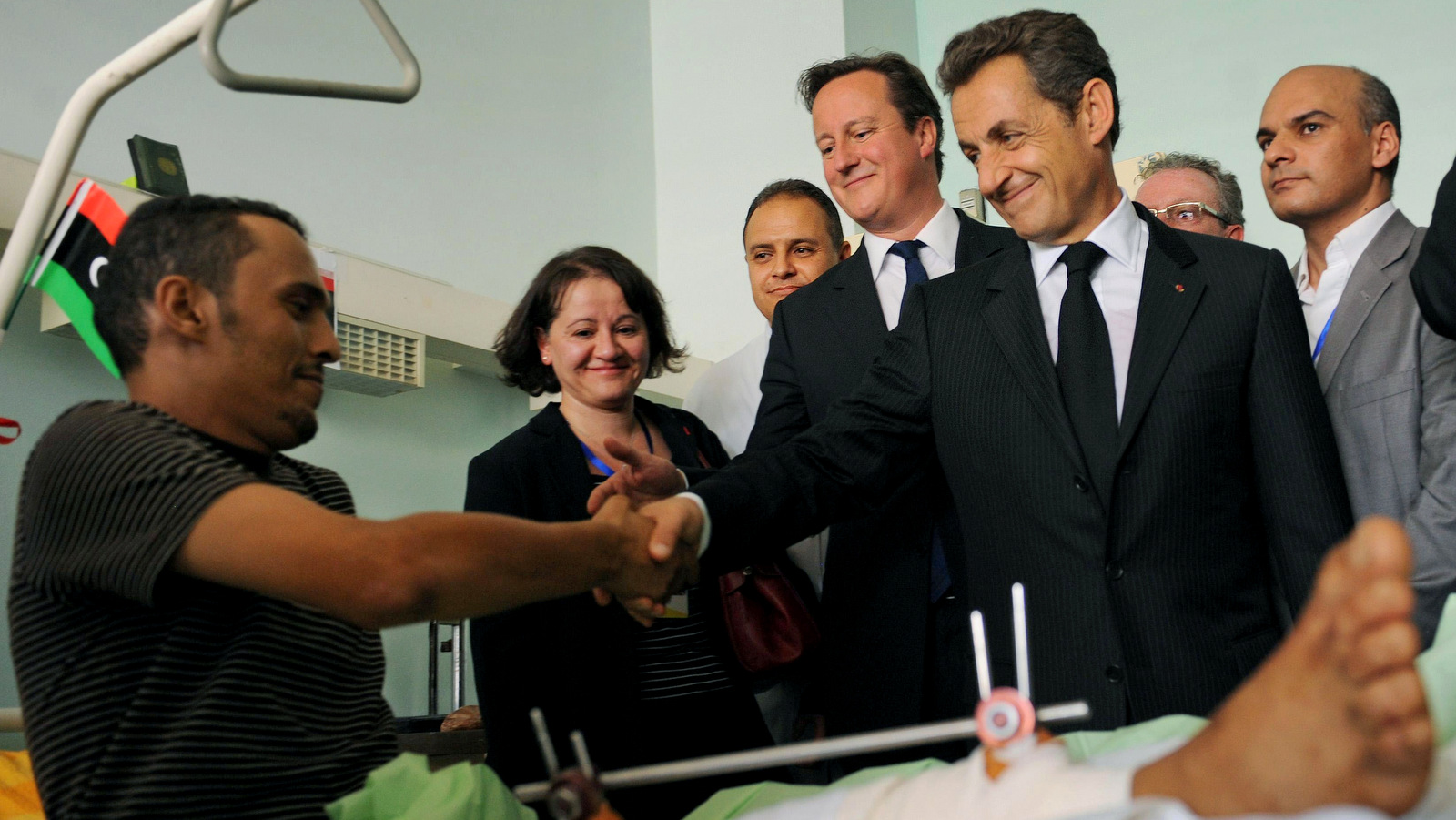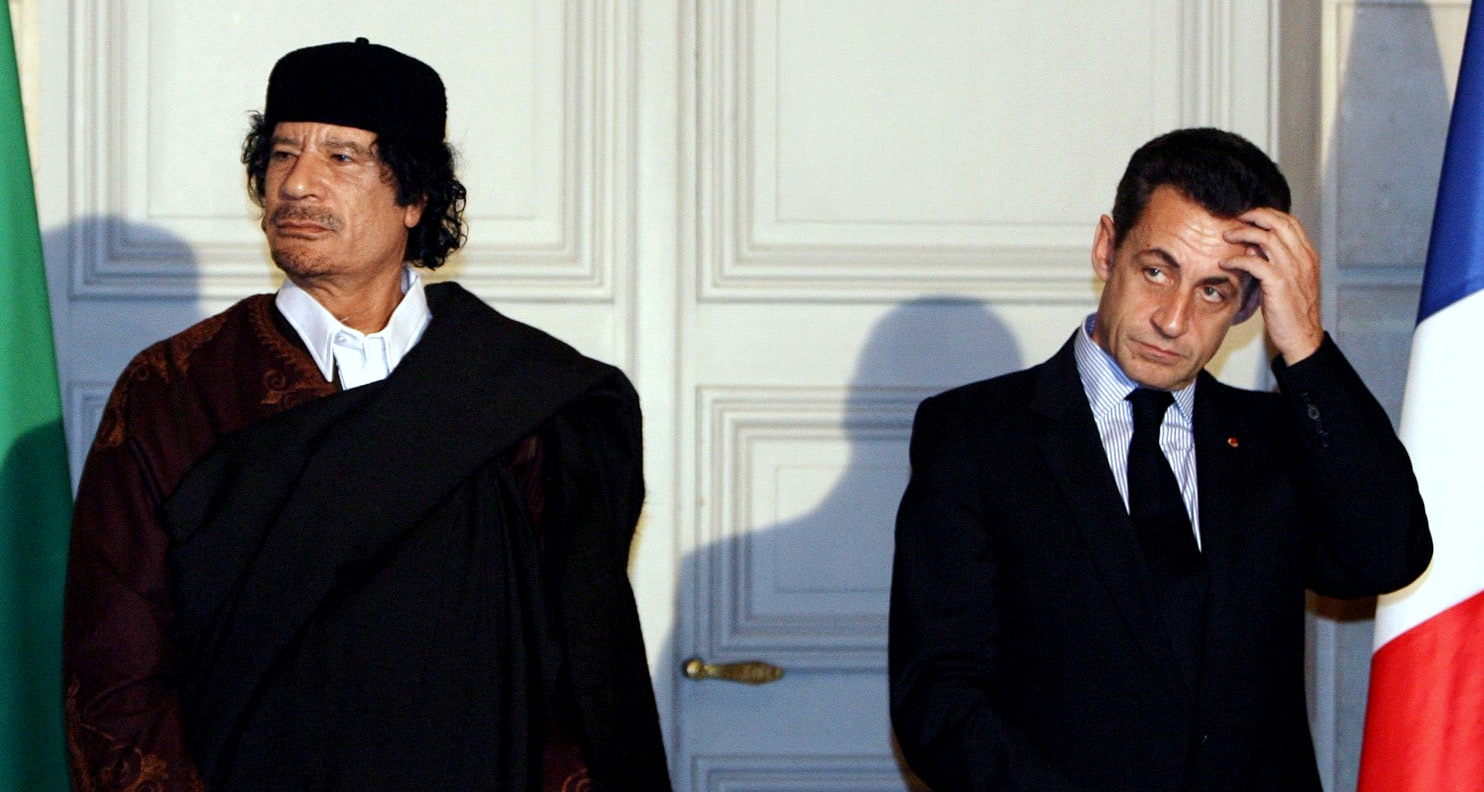PARIS – Former French President Nicolas Sarkozy was arrested Tuesday and indicted last night on charges related to the illegal funding of his successful 2007 campaign for president. The investigation, which began nearly five years ago, has focused on illegal campaign contributions Sarkozy’s campaign received from Muammar Gaddafi, the former leader of Libya, who was brutally murdered following the UN-backed destruction of his government and country.
The investigation into Sarkozy’s shady connections to Gaddafi has gained steam since late 2016, when French-Lebanese businessman Ziad Takieddine claimed that he had personally delivered suitcases containing €5 million ($6.2 million) in cash to Sarkozy on Gaddafi’s behalf. More recently, several former senior figures in Gaddafi’s government provided new evidence to French investigators confirming the illicit campaign contributions. Overall, Sarkozy’s 2007 presidential campaign is believed to have received €50 million ($62 million) in funding from Gaddafi. This not only exceeded the legal limit for funding for the entire campaign by €21 million but also violated French laws regarding foreign donations to politicians.
Watch | In a 2011 interview, Gaddafi’s son demands Sarkozy repay Libya money he took for his presidential campaign
WATCH: During an exclusive interview with Euronews in 2011, Colonel Gaddafi’s son demanded Sarkozy to repay Libya the money he took for his 2007 campaign election that helped him become French president.
Read more: https://t.co/JE4l87W762 pic.twitter.com/Mo3SHK2D1V
— euronews (@euronews) March 20, 2018
Sarkozy and the manager of his 2007 campaign have denied accepting money from Libya. Sarkozy has also denied accepting illegal funds for his unsuccessful campaign for re-election in 2012, which has also been the subject of scrutiny.
While Sarkozy has long denied these allegations, his arrest over how his past campaign was financed and his relationship with Gaddafi has renewed interest in Sarkozy’s role in the 2011 destruction of the Libyan state as well as fresh speculation regarding Sarkozy’s motives.
Moral high ground or old Mafia trick?

In 2011 — while the U.S., U.K. and France were leading the charge against Gaddafi — Sarkozy was widely praised in the Western press for “choosing the right course” and “taking a high but legitimate risk that he can retake the moral (and political) high ground” by violently forcing Gaddafi out of power.
However, Gaddafi’s alleged contributions to his 2007 campaign suggest that Sarkozy’s reasons for becoming involved had little to do with a humanitarian desire to “protect” the Libyan people – as Sarkozy had claimed at the time — and more to do with silencing a key witness to his illegal behavior, Gaddafi himself.
In 2012, reports surfaced — based on comments made by Mahmoud Jibril, former interim Prime Minister of Libya following Gaddafi’s overthrow, on Egyptian TV — that Gaddafi’s gruesome death, which was captured on video, had been carried out by the French secret service. Jibril had stated that “it was a foreign agent who mixed with the revolutionary brigades to kill Gaddafi.”
Read more by Whitney Webb
- The Media’s Curious Coverage of the “Second Snowden”
- Trump’s Latest “Deal”: Sell Syria to Saudi Arabia for $4 Billion
- US Commander: ‘US Troops Prepared to Die for Israel’ in War against Syria, Hezbollah
- Scream Loudly and Carry a Nuclear Arsenal: The Dangers of Trump’s “Nuclear Diplomacy”
Reports from the Italian newspaper Corriere della Serra later asserted that the foreign agent had been French, citing diplomatic sources in the Libyan capital of Tripoli. Those same diplomatic sources had further stated that Gaddafi had openly threatened to reveal the full details of his ties to Sarkozy, including his financing of Sarkozy’s 2007 campaign, once NATO first voiced support for the 2011 uprising.
Sarkozy, however, was interested in more than keeping his shady dealings with Gaddafi from public scrutiny. Leaked emails from former Secretary of State Hillary Clinton showed that Sarkozy – like other countries backing Western intervention in Libya – had several goals in deposing Gaddafi. As the Foreign Policy Journal reported in 2016, these included increasing French influence in North Africa, obtaining Libyan oil, increasing Sarkozy’s popularity domestically, and demonstrating French military power.
In addition, Gaddafi’s large gold and silver reserves were seen as a threat to the French franc and its circulation in North Africa. Gaddafi’s plan to establish a gold-backed currency, to use to sell Libya’s oil, strengthened this economic threat to France as well as to the hegemony of the American petrodollar.
Yet, while the other nations were primarily involved in Libya’s destruction to prevent the dinar’s creation and to gain access to Libya’s oil, Sarkozy may have been chiefly interested in saving his own skin – an effort that may have been all for naught given his recent arrest.
Top Photo | Former Libyan leader Moammar Gadhafi, left, and French President Nicolas Sarkozy, pose during a ceremony at the Elysee Palace in Paris in December, 2007. (Patrick Hertzog/AP)
Whitney Webb is a staff writer for MintPress News who has written for several news organizations in both English and Spanish; her stories have been featured on ZeroHedge, the Anti-Media, and 21st Century Wire among others. She currently lives in Southern Chile.


